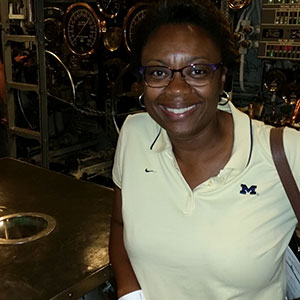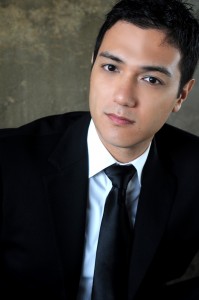A Community of Singers, Right Here in Ann Arbor

Photo: UMS Choral Union on stage for Handel’s Messiah at Hill Auditorium. Photo by Mark Gjukich Photography.
Karen Isble is Assistant Vice President of Development at the University of Michigan, and she’s also been a member of the UMS Choral Union, Ann Arbor’s 137 year-old, Grammy Award-winning community choir, for nearly eight years.
We chatted with her about her most memorable experiences, including a performance in blizzard conditions, the community, and outgoing music director Jerry Blackstone.

Karen Isble
UMS: What do you love about singing?
Karen Isble: I’ve been a singer all my life. I have two music degrees, one of them in voice performance from the University of Michigan. Earlier in my life, I had visions of becoming a professional performer. When that didn’t come to fruition, I wanted to make sure that I had an opportunity to use that part of myself. Singing became my avocation. I joined the UMS Choral Union in 2007 when I began to work for the University.
UMS: 2007, you’re coming up on eight years with the Choral Union, wow! What are some of the highlights of your experiences with the Choral Union?
KI: One of the highlights, and there have been many, was singing the Saint Matthew Passion several years ago in what was the last blizzard of that spring. I work here on campus, so I had an advantage over a number of folks who were coming in, some people come from as far as Ohio, and certainly from the rest of southeastern Michigan or East Lansing. Members of the Detroit Symphony were coming in from Detroit. We had a children’s choir coming in from Michigan State University.
This snow storm was horrible, and I think it was going to be a three hour concert. As the choir arrived, UMS president Ken Fischer came out on stage and said, “Let’s everybody get the choir on stage. We’re waiting for the orchestra to get here, we’re waiting for the kids to get here, go out and wave your hands so that the audience knows something’s happening.” So, I think, the choir, or those of us who had made it there, ended up going out and sitting on the risers for about an hour while we sort of waited for everyone else to arrive.
Amazingly, the house was packed. I thought there’d be tons of empty seats, but the audience was full to the rafters, all the way up to the second balcony. As each group of musicians showed up, these cheers would go up from the audience. And once the children’s choir arrived, there was an ovation. So then, about an hour late, we dove into this wonderful, wonderful, incredible piece of music, which I hadn’t sung in about twenty years up to that point. So I was really thrilled to have the opportunity to do it again. I had a small solo that Jerry Blackstone had granted me. It was a very transformative performance. It was just this badge of honor, we had made it through this blizzard and we had a wonderful evening.
UMS: A truly “Michigan” story!
KI: There were tales of people abandoning their cars. I remember that a member of the choir said, “I abandoned my car, I couldn’t drive any further. I just walked the rest of the way.” That sort of thing.
UMS: Has there been anything surprising in your experience with the Choral Union? Something that has challenged you or something that’s been a particularly good learning experience for you as a singer?
KI: Before the Choral Union, I’d mostly done solo singing, chamber music, small choir singing, and I wasn’t really sure I would enjoy singing with a group this size. Every year we’d start out with close to 200 folks of every skill level. What has surprised me over and over again is how beautiful and agile a choir of 150 to 200 people can be, and what incredible music we can make. It doesn’t happen all of the time, sometimes we’re just big and loud! But when we have an opportunity to be something a little different, I’m always pleasantly surprised at how well the group comes through.
UMS: It seems that there’s a real sense of community outside of the singing, too, within the group. Would you say that that’s true?
KI: I think that’s true. I think there are a lot of folks, certainly, who have been with the Choral Union for decades, and they have sort of formed that foundation. But I think one of the things that the group does well is have a huge spectrum of participants. We have students who join each year and are part of the equation, and that’s nice, and they’re a little more fluid. Many of the members are also one-time students who have come back a decade later, working in the Ann Arbor area now and looking for another creative outlet.
But definitely a sense of community. I think it grows on you the longer you are there. It takes a bit of time to find your place in a group that big. I certainly feel very at home with the Choral Union though I don’t know everybody, I don’t know that I ever could. You get to know the faces, and when you see them in unexpected places around town you kind of give that high-five or, “Hey, how’re you doing?”
UMS: What would you say to someone who is considering joining the Choral Union?
KI: For me, singing in the Choral Union is my respite from the day-to-day grind. It’s a wonderful escape. It’s hard, actually, sometimes to get myself pumped up for it on a Monday night after a full day’s work, but as soon as we start to sing, it’s almost immediate, and I always leave revitalized. And so I would say if people are thinking about it, weighing adding it to their schedule, that the Choral Union can re-energize you is a really important part of that.
UMS: The Summer Sings on July 6 is the final Choral Union moment for outgoing music director Jerry Blackstone. Would you like to say anything about your experiences with Jerry?
KI: I had the opportunity, as a University of Michigan grad student, to sing with Jerry. As I mentioned, he was the catalyst for my joining the Choral Union. Jerry has fostered the Choral Union community. His ability to be so musical and so warm and so inviting to everyone at every musical level really made the difference during his term as the music director.
Do you sing? New singer auditions for the UMS Choral Union will be held in August and September 2015.
Michigan Messiah: Nicholas Phan, tenor
It’s Messiah week at UMS–and extra special this year is our cast of soloists–all have Michigan connections! Some are Michigan natives, some are alumni from U-M’s School of Music, Theatre & Dance, and some are both!
This week, we will feature a post from each Messiah soloist, where they will reflect on what it means to return to Michigan and sing in our annual tradition of Handel’s Messiah!
The very first time I ever heard Handel’s Messiah, I remember sitting in the first balcony of Hill Auditorium, carefully reading  the program notes before the performance, trying to understand what exactly this Messiah-thing was. I was so young I don’t even remember precisely what year it was, but it was long before I ever considered becoming a singer. The reason I remember going was to see my violin teacher play in the Symphony. I had lots of questions: Did it tell a story? Why do we all stand up to sing along with that “Hallelujah” moment? What is an “Oratorio,” anyway? My inquisitive mind absorbed as much as it could before the first notes of the Overture. From that moment on, I was transfixed.
the program notes before the performance, trying to understand what exactly this Messiah-thing was. I was so young I don’t even remember precisely what year it was, but it was long before I ever considered becoming a singer. The reason I remember going was to see my violin teacher play in the Symphony. I had lots of questions: Did it tell a story? Why do we all stand up to sing along with that “Hallelujah” moment? What is an “Oratorio,” anyway? My inquisitive mind absorbed as much as it could before the first notes of the Overture. From that moment on, I was transfixed.
The first balcony of Hill was my favorite place to see concerts while I was growing up in Ann Arbor. It felt like the perfect distance from the stage—I wasn’t too far away to feel disconnected (not that distance matters in Hill—the sound actually gets better the higher up you sit), and I wasn’t too close, so I could see all of the action without missing a thing. It was from that first balcony that I caught a glimpse of how powerfully expressive music-making could be, watching Yo-Yo Ma play the Dvořák cello concerto with the Orchestra of St. Luke’s, getting my first taste of live great singing when Cecilia Bartoli offered a recital, and having my heart broken by Les Arts Florissants’ semi-staged performance of Acis and Galatea.
I cultivated my passion for classical music as an audience member in Hill, and it was on the stage that I cut my teeth as a young performing musician. It was in Hill, sitting in the back of the viola section of the Michigan Youth Symphony where I discovered what it was like to play in a large symphony orchestra. A year later, on a whim, as a sophomore in high school, I went to sing a last minute audition for Jerry Blackstone to try and get into the Michigan Youth Chamber Singers. Not having anything else to sing for him, I sang the national anthem. After I had finished, he said “sounds great!” and told me to go pick up some music for our first rehearsal that afternoon. A few months later, he would assign me my very own first, tiny oratorio solo to sing in Hill in Mozart’s Regina Coeli, and my journey as a singer had begun. I would spend the next seven years performing intermittently and even recording in Hill as a choral singer and soloist, honing my craft and gaining valuable experience that would set the foundation of what would turn out to be a life in music. To come back to Hill for such an important UMS tradition, standing on stage as a colleague with the people who started me on this life journey, marks not only a dream come true, but the ultimate homecoming.
—Nicholas Phan, tenor soloist, Ann Arbor native, and U-M School of Music, Theatre & Dance alumnus


